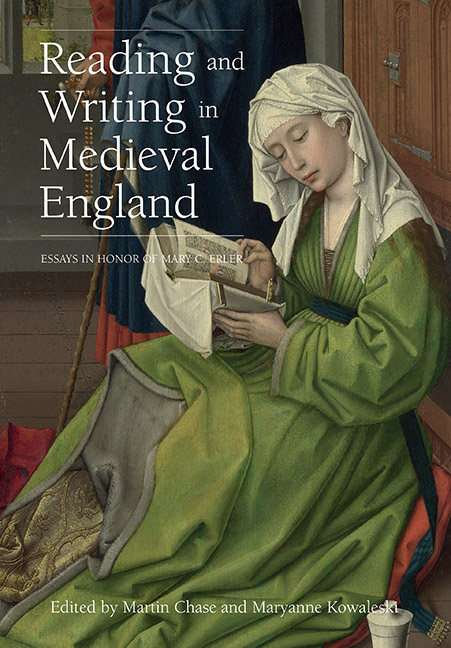Book contents
- Frontmatter
- Contents
- List of Illustrations
- List of Contributors
- List of Abbreviations
- Introduction: Bibliography in the Service of Biography
- “Withinne a Paved Parlour”: Criseyde and Domestic Reading in a City under Siege
- Beatrice Melreth: A London Gentlewoman and her Books
- How Intellectual Were Fifteenth-Century Londoners? Grammar versus Logic in the Citizens’ Encounters with Learned Men
- Social Memory, Literacy, and Piety in Fifteenth-Century Proofs of Age
- Crafting the Old Testament in the Queen Mary Psalter
- Affective Reading and Walter Hilton's Scale of Perfection at Syon
- Book Accessories, Gender, and the Staging of Reading
- Enska Vísan: Sir Orfeo in Iceland?
- Reading the Real Housewives of John Foxe's Book of Martyrs
- The Writings of Mary Carpenter Erler
- Index
- Tabula Gratulatoria
Introduction: Bibliography in the Service of Biography
Published online by Cambridge University Press: 21 June 2019
- Frontmatter
- Contents
- List of Illustrations
- List of Contributors
- List of Abbreviations
- Introduction: Bibliography in the Service of Biography
- “Withinne a Paved Parlour”: Criseyde and Domestic Reading in a City under Siege
- Beatrice Melreth: A London Gentlewoman and her Books
- How Intellectual Were Fifteenth-Century Londoners? Grammar versus Logic in the Citizens’ Encounters with Learned Men
- Social Memory, Literacy, and Piety in Fifteenth-Century Proofs of Age
- Crafting the Old Testament in the Queen Mary Psalter
- Affective Reading and Walter Hilton's Scale of Perfection at Syon
- Book Accessories, Gender, and the Staging of Reading
- Enska Vísan: Sir Orfeo in Iceland?
- Reading the Real Housewives of John Foxe's Book of Martyrs
- The Writings of Mary Carpenter Erler
- Index
- Tabula Gratulatoria
Summary
Mary Erler's scholarship has been at the forefront of what has been called a “remarkable efflorescence” or “second wave” in studies of the history of the book and the material text that began in the last decade of the twentieth century. Her vision has expanded the scope of questions that can be asked – and answered – and has helped to break down traditional boundaries between periods, genres, media, social classes, religious states, and genders. Her approach is focused and distinctive enough to constitute a method in itself, but it also engages a variety of other methods to analyze and assess the larger picture. Her interdisciplinary work has interacted with and contributed to book studies, literary studies (new philology, new historicism, feminism), social history, ecclesiastical history, and good old-fashioned intellectual history, among others. Erler's work realigns earlier ideas about periodization: much of it is situated in the unsettled times of late fifteenth- and early sixteenth-century England, and so deals with early printed books as well as late manuscript codices. Her writings consider a broad range of groups, including Catholics (lay and religious), Lollards and Anglicans, men and women, aristocrats and bourgeoisie.
The material object, be it printed volume, manuscript, or legal document, is invariably the starting point of her enquiry, but the primary object of interest is always the human subject who produced, read, shared, inherited, bequeathed, or treasured it. The term Erler associates with her work – “bibliographical study” – may strike some as old-fashioned or even pedestrian, but in Erler's hands “bibliographical study” is cutting-edged, nuanced, and deeply revealing. “Bibliography” is tellingly the first word of her ground-breaking study, Women, Reading, and Piety in Late Medieval England (2002):
Bibliography has sometimes been moved by what might seem an especially pure form of the historical impulse: the wish to use physical objects, books, to reveal something about non-physical realities: about intellectual lives, about manners or habits in the past. Viewed in this way, books have continued to signal seductively their potential as guides and markers to another age's sensibility. In fact current fascination with book provenance has perhaps derived from the insight of the histoire du livre school that research into book ownership could offer a novel way in to social history, one which might make visible even the elusive matters of personal preference and personal taste, always particularly difficult to recover.
- Type
- Chapter
- Information
- Reading and Writing in Medieval EnglandEssays in Honor of Mary C. Erler, pp. 1 - 8Publisher: Boydell & BrewerPrint publication year: 2019



